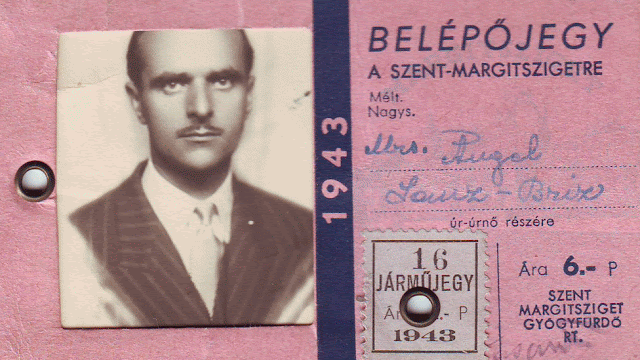Thousands of Holocaust survivors and their descendants escaped the Nazis thanks to a Spanish diplomat nicknamed "the Angel of Budapest" - yet the late Angel Sanz Briz is hardly known in Spain today.
|
| The diplomatic ID for Angel Sanz Briz issued in 1942 |
"He is a hero of greater stature than Schindler," says Eva Benatar. Her mother sheltered her as a baby just weeks old and her brother in one of the safe houses set up by Sanz Briz in Nazi-occupied Budapest.
Oskar Schindler was a German industrialist who managed to save more than 1,000 Jews from the Holocaust. His story was told in the Hollywood movie Schindler's List.
 |
| Eva Benatar with one of her grandchildren |
Sanz Briz was serving in Spain's embassy as commercial attaché, before being left in charge of the mission in mid-1944 at the age of 33. He was one of a group of diplomats who decided to rescue Hungarian Jews.
In a matter of weeks the SS deported more than 400,000 Jews to Auschwitz.
One of the Spaniard's fellow humanitarian conspirators became a household name - Raoul Wallenberg, the Swedish diplomat who issued "protective passports" and saved tens of thousands of Jews.
Wallenberg later disappeared; he was seized by occupying Soviet forces and is widely thought to have died in a Soviet jail.
 |
| Nazi Germany murdered at least 1.1m people at Auschwitz death camp in Poland |
As reports grew about the escalating Holocaust at Auschwitz and other Nazi killing sites, Sanz Briz started informing the fascist Franco government in Spain about the appalling truth.
A key document he sent was the Vrba-Wetzler report, by two Jewish escapees from Auschwitz.
However, for several months he received no instructions from a regime that had initially backed Hitler in the war.
 |
| Part of the Vrba-Wetzler report on the Nazi gas chambers at Auschwitz - sent by Sanz Briz to Madrid |
Remarkably, he began to take the law into his own hands, falsifying consular documents to grant nationality to refugees on the basis of a long-expired 1924 Spanish law aimed at Sephardic Jews, even though Hungary's Jewish community was overwhelmingly Ashkenazi.
Jews were hidden in the Spanish embassy in Buda, bribes were paid to local officials. Sanz Briz braved the dangers of Nazi and Hungarian fascist Arrow Cross patrols, as well as Allied bombing raids, to shelter Jews at risk.
"I managed to get the Hungarian government to authorise the protection by Spain of 200 Sephardic Jews. Then I turned those 200 units into 200 families; and those 200 families were multiplied indefinitely, through the simple procedure of not expediting any safe conduct to Jews with a number higher than 200," Sanz Briz wrote in his report for the Spanish government from Berne in December 1944.
"He added letters to each number, using the whole alphabet," explains the diplomat's son, Juan Carlos Sanz Briz.
 |
He was a virtuoso in diplomacy; he put human rights before the law of the land, and was one of the first diplomats to use diplomatic immunity to protect refugees."
|
 |
| This Spanish joint passport got the Vándor family to safety from Hungary |
Born in a cramped cellar, she never met her father, who died in the so-called death marches in early 1945.
But baby Eva, her mother and brother were able to escape Hungary, ending up in Tangier, then an international city, although the family eventually settled in Spain.
 |
| In 1998 Spain belatedly celebrated Sanz Briz with these 35-peseta stamps |
Posthumous recognition
Sanz Briz left Budapest in November 1944, ordered out by his superiors in Madrid, who feared he would suffer reprisals from the approaching Soviet army, due to Spain's help for the Germans on the Eastern front.
He retreated into a regular diplomatic career, and was not permitted by the stridently anti-Israel Franco regime to receive the honour of Righteous Among the Nations by Yad Vashem, Israel's Holocaust memorial centre, in his lifetime.
He joined the ranks of the righteous in 1966.
An obituary for Sanz Briz published by Spain's ABC newspaper in 1980 makes no mention of his exploits in Budapest.
"I never talked about this subject with him. It was not something that was discussed at home," says Juan Carlos Sanz Briz. "He must have suffered greatly, but he didn't tell us that."

Spain and the Holocaust
Before Spain returned to democracy in the mid-1970s, the Franco regime had an ambivalent stance on its role in the Holocaust, sometimes claiming that Gen Franco had in fact been a saviour of Jews.
 |
| Franco needed arguments to improve relations with Israel, and he asked my father to say that he had acted in the head of state's name. He agreed, but it was completely untrue" |
When the Nazis began deporting Jews from France, the Franco regime at first allowed many thousands to flee through Spanish territory, before tightening the policy in 1940.
Jews were refused transit papers, and those caught in the country illegally were rounded up and sent to a concentration camp at Miranda de Ebro.
At no time was any significant number of Jews given the option of refuge in Spain, not even Spanish-speaking Sephardic Jews from the Nazi-occupied Greek city of Thessaloniki.
But there is evidence that Franco began to sense the need to improve his regime's international image as it became increasingly clear that Hitler was losing the war.
On 24 October, 1944, then foreign minister José Félix de Lequerica sent a telegram to Sanz Briz in Budapest. "On request of the World Jewish Congress please extend protection to largest number persecuted Jews," it said.




